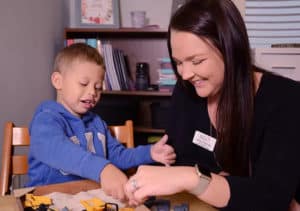 What to Expect During the Initial Evaluation
What to Expect During the Initial Evaluation
A speech and language evaluation is the measurement of a person’s communication skills. It is done by a speech-language pathologist to find out if a person has communication problems. Comprehensive evaluations at this Center are scheduled for 1½ – 2 hours.
The speech-language pathologist will begin by asking you about your child’s communication issues. Be specific – don’t hesitate to share your observations. The speech-language pathologist may be a professional in her field, but you know your child best. The speech-language pathologist may ask questions about:

-
Family History
-
Pre-natal History
-
Pregnancy/Delivery
-
Physical Development
-
History of hospitalization/injuries/illnesses
-
Educational History
-
Communication History
The more information you are able to share with the evaluator – the better. The more the speech-language pathologist knows about your child the easier it is to see the “whole picture.” This will allow her to diagnose your child more accurately and tailor therapy to treat your child’s deficits to the highest extent possible.
During the initial assessment, the evaluator may use informal or formal tests, or a combination of both, that are carefully chosen to specifically address the area of concern. Formal tests are simply standardized tests. The results of standardized tests are given in standard scores and percentiles. This indicates what range your child is in (above average, average, or below average) as compared to your child’s peers taking the same test. A speech-language pathologist conducting an informal test will appear to simply be chatting or playing with the child. In actuality, she’s evaluating how the child articulates words, puts sentences together, and processes questions.
As part of the evaluation, the speech-language pathologist will formally or informally observe and evaluate your child’s receptive (his/her understanding of spoken language) and expressive (how he/she communicates his/her wants and needs) language, articulation (how he/she makes sounds), voice (if his/her voice is healthy, hoarse, nasal, etc.), fluency (how fluent his/her speech sounds), oral motor structures (if his/her lips, tongue, jaw and other oral motor structures appear to be intact and functioning properly for speech production), and feeding (his/her swallowing, chewing, food intake). A hearing screening is also part of each speech and language evaluation as a hearing problem may affect speech and language development.
At the end of the speech and language evaluation, you will get to hear the speech-language pathologist’s preliminary findings. Recommendations will be made for direct or indirect therapy, or monitoring and follow-up appointments. You may be told things that you can do at home, things to be done at school, or what direction therapy will go.
 Also, your child may be referred to other professionals such as…
Also, your child may be referred to other professionals such as…
-
Audiologists (hearing)
-
Occupational Therapists (sensory processing, fine motor skills)
-
Physical Therapists (physical development)
-
Otolaryngologists – ENT (ear, nose, throat)
-
Psychologists (behavioral and other disorders)
-
Developmental Pediatricians (neurodevelopmental disorders)
Depending on the circumstances, such as voice, resonance, feeding, and hearing problems, a speech-language pathologist may refuse to treat your child until the collaborating professional is consulted. This is a sign of a good speech-language pathologist because she knows that doing therapy with an underlying problem is useless and unethical.
Shortly after your child’s evaluation, a written report detailing his or her results will be mailed to your home and provided to the child’s physician and others involved in the child’s care as requested.
How Do I Schedule an Initial Evaluation Appointment?
Discuss your concerns with your child’s pediatrician and request a referral or call our office and speak to our receptionist. She will collect contact and insurance information, as well as set up an evaluation appointment that best fits your schedule.
